状语从句的种类
状语从句完整版
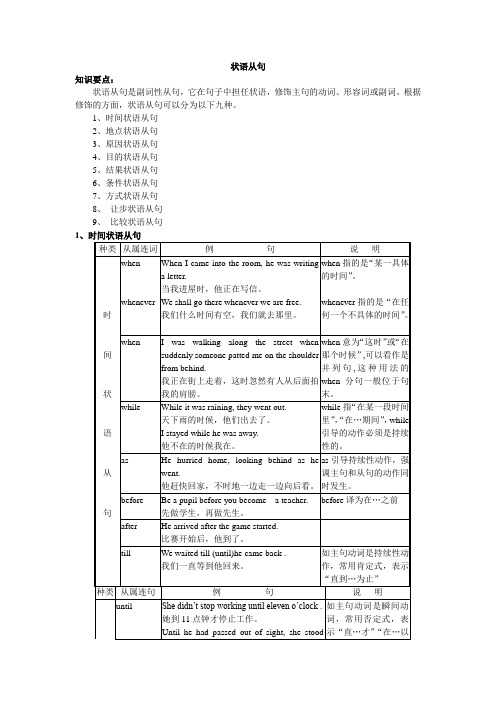
间
状
when
I was walking along the street when suddenly someone patted me on the shoulder from behind.
我正在街上走着,这时忽然有人从后面拍我的肩膀。
when意为“这时”或“在那个时候”,可以看作是并列句,这种用法的when分句一般位于句末。
万一我忘了,请提醒我一下。
So far as I know, the book will be published next month.
据我所知,那本书下月出版。
unless从句的谓语只能用肯定式。unless和if…not同义,unless是书面语,if…not是口语,通常二者可以换用。
条件状语从句中的谓语动词的时态一般要用现在时或过去时代替一般将来时或过去将来时。
他的行动就好象什么也没有发生。
They treat the black boy as if (though) he were an animal.
他们对待这黑孩子仿佛他是一头牲口。
此处as译为,按照或正如
as if或as though的意义和用法基本一样。从句中可以用现在时表示可能符合事实,也可以用虚拟语气。
It is so interesting a novel that all of us want to read it.
这是一本十分有意思的书,大家都想看。
such…that的such后面跟名词,如果名词是单数就要用such a /an…that还可以转换用so…that,语气较强
种类
从属连句
例句
说明
即使明天下雨,我也要去。
状语从句的种类及引导词
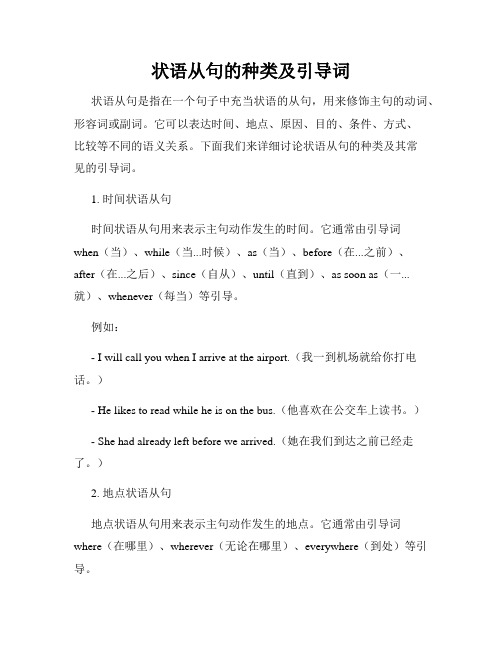
状语从句的种类及引导词状语从句是指在一个句子中充当状语的从句,用来修饰主句的动词、形容词或副词。
它可以表达时间、地点、原因、目的、条件、方式、比较等不同的语义关系。
下面我们来详细讨论状语从句的种类及其常见的引导词。
1. 时间状语从句时间状语从句用来表示主句动作发生的时间。
它通常由引导词when(当)、while(当...时候)、as(当)、before(在...之前)、after(在...之后)、since(自从)、until(直到)、as soon as(一...就)、whenever(每当)等引导。
例如:- I will call you when I arrive at the airport.(我一到机场就给你打电话。
)- He likes to read while he is on the bus.(他喜欢在公交车上读书。
)- She had already left before we arrived.(她在我们到达之前已经走了。
)2. 地点状语从句地点状语从句用来表示主句动作发生的地点。
它通常由引导词where(在哪里)、wherever(无论在哪里)、everywhere(到处)等引导。
例如:- Please meet me where we first met.(请在我们第一次见面的地方见我。
)- You can find good food wherever you go.(无论你去哪里,都能找到美食。
)3. 原因状语从句原因状语从句用来表示主句动作发生的原因。
它通常由引导词because(因为)、since(因为)、as(因为)、for(因为)、now that (既然)、seeing that(鉴于)等引导。
例如:- I didn't go to the party because I was not feeling well.(我没去参加派对是因为我身体不舒服。
状语从句的种类及其在句子中的位置

状语从句的种类及其在句子中的位置状语从句是英语中常见的从句类型之一。
它在句子中用来修饰动词、形容词、副词等,起到更加具体和详细的说明和补充的作用。
本文将介绍状语从句的种类及其在句子中的位置。
一、状语从句的种类1. 时间状语从句时间状语从句用来表示动作或事件发生的时间、顺序、频率等。
常见的引导词有when(当...时候)、while(当...的时候)、as(当...时候)等。
例如:- I will go to bed when I finish the report.(我完成报告时,就去睡觉。
)- While she was cooking, her phone rang.(她在煮饭时,手机响了。
)- As I was leaving, it started to rain.(当我离开时,开始下雨了。
)2. 地点状语从句地点状语从句用来表示动作或事件发生的地点。
常见的引导词有where(在哪里)、wherever(无论在哪里)等。
例如:- He will meet you where we first met.(他会在我们初次见面的地方和你见面。
)- Wherever you go, I will follow.(无论你去哪里,我都会跟随。
)原因状语从句用来表示动作或事件发生的原因。
常见的引导词有because(因为)、since(因为)、as(因为)等。
例如:- He didn't come to the party because he was sick.(他因为生病所以没有来参加派对。
)- Since it's raining, we should stay at home.(因为下雨了,我们应该待在家里。
)4. 目的状语从句目的状语从句用来表示动作或事件的目的。
常见的引导词有so that (以便)、in order that(为了)等。
例如:- I study hard so that I can pass the exam.(我努力学习,以便能通过考试。
状语从句

状语从句的“简化”现象常存在于以下五种状语从句中: ①由if, unless等引导的条件状语从句; ②由although, though, even if / though等引导的让步状语从 句; ③由when, while, as, before, after, until / till等引导的时间状 语从句; ④由as, as if等引导的方式状语从句; as, than ⑤由as, than等引导的比较状语从句。
状语从句
Adverbial Clause
状语从句 (Adverbial Clause)
状语从句指句子用作状语时,起副词作用 的句子。它可以修饰谓语、非谓语动词、 定语、状语或整个句子。根据其作用可分 为时间、地点、原因、条件、目的、结果、 让步、方式和比较等从句。状语从句一般 由连词(从属连词)引导,也可以由词组引起。 从句位于句首或句中时通常用逗号与主句 隔开,位于句尾时可以不用逗号隔开。
状语从句可分为:
状语从句的种类
1.时间状语从句;(adverbial clause of time) 2.地点状语从句;(adverbial clause of place) 3.原因状语从句;(adverbial clause of cause) 4.条件状语从句;(adverbial clause of condition) 5.目的状语从句;(adverbial clause of purpose) 6.让步状语从句;(adverbial clause of concession) 7.比较状语从句;(adverbial clause of comparison) 8.方式状语从句;(adverbial clause of manner) 9.结果状语从句。(adverbial clause of result
完整版)状语从句(9种全)

完整版)状语从句(9种全)状语从句在复合句中起到修饰主句的作用,分为时间、地点、原因、目的、结果、条件、方式、比较、让步等种类。
1.时间状语从句时间状语从句的连接词包括when。
as。
while。
after。
before。
since。
ever since。
as soon as。
once。
till。
until。
whenever。
no sooner…than。
hardly/scarcely。
when。
the moment/minute/instant/second。
every time。
each time。
any time。
the first time。
next time。
last time。
all the time。
by the time。
directly。
immediately。
instantly等。
例如,“一···就···”的句型可以用as soon as或once引导,其中as soon as侧重时间或动作先后衔接紧,而once侧重条件,表示“一旦。
”;on doing sth/on one's + n.作时间状语,例如On arriving at the n。
the thief was arrested.意为“一到达车站,这个小偷就被逮捕了。
”2.地点状语从句地点状语从句的连接词包括where。
wherever。
anywhere。
everywhere等。
例如,I'll go wherever you go.意为“你去哪儿,我就跟你去哪儿。
”3.原因状语从句原因状语从句的连接词包括because。
since。
as。
now that。
seeing that。
considering that等。
例如,Since it's raining。
we'll stay indoors.意为“因为下雨,我们将待在室内。
状语从句的种类和常见引导词
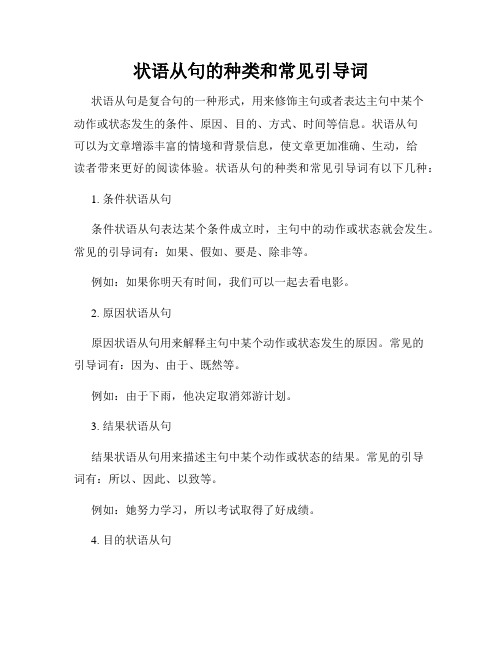
状语从句的种类和常见引导词状语从句是复合句的一种形式,用来修饰主句或者表达主句中某个动作或状态发生的条件、原因、目的、方式、时间等信息。
状语从句可以为文章增添丰富的情境和背景信息,使文章更加准确、生动,给读者带来更好的阅读体验。
状语从句的种类和常见引导词有以下几种:1. 条件状语从句条件状语从句表达某个条件成立时,主句中的动作或状态就会发生。
常见的引导词有:如果、假如、要是、除非等。
例如:如果你明天有时间,我们可以一起去看电影。
2. 原因状语从句原因状语从句用来解释主句中某个动作或状态发生的原因。
常见的引导词有:因为、由于、既然等。
例如:由于下雨,他决定取消郊游计划。
3. 结果状语从句结果状语从句用来描述主句中某个动作或状态的结果。
常见的引导词有:所以、因此、以致等。
例如:她努力学习,所以考试取得了好成绩。
4. 目的状语从句目的状语从句表达主句中某个动作或状态的目的。
常见的引导词有:为了、以便、以免等。
例如:他每天早起为了赶上早班公交车。
5. 比较状语从句比较状语从句用来对主句中某个动作或状态进行比较。
常见的引导词有:像、与其、比较等。
例如:与其抱怨,不如积极行动。
6. 方式状语从句方式状语从句描述主句中某个动作或状态的方式或方法。
常见的引导词有:如何、怎样等。
例如:他告诉我如何正确使用这个软件。
7. 时间状语从句时间状语从句描述主句中某个动作或状态发生的时间。
常见的引导词有:当、一直到、每当等。
例如:当我听到好消息时,我高兴得跳了起来。
在写文章时,我们可以根据需要使用不同种类的状语从句来丰富文章的内容,增加语言的准确性和生动性。
熟练掌握状语从句的种类和常见引导词,有助于我们写出优秀的作文或文章。
希望以上内容对您有所帮助!。
英语语法:状语从句的多种种类介绍

【导语】状语从句修饰主句/主句的谓语。
⼀般有九⼤类:表⽰时间、地点、原因、⽬的、结果、条件、让步、⽐较和⽅式等。
®⽆忧考⽹整理了相关内容,快来看看吧!希望能帮助到你~更多相关讯息请关注®⽆忧考⽹! 1、时间状语从句 常⽤引导词: when, as, while, as soon as, while, before, after, since , till, until 特殊引导词: the minute, the moment, the second, every time, the day,the instant, immediately , directly, no sooner …than, hardly …when, scarcely …when I didn't realize how special my mother was until I became an adult. While John was watching TV, his wife was cooking. The children ran away from the orchard (果园) the moment they saw the guard. No sooner had I arrived home than it began to rain. Every time I listen to your advice, I get into trouble. 2、地点状语从句 常⽤引导词: where 特殊引导词: wherever, anywhere, everywhere Generally, air will be heavily polluted where there are factories. Wherever you go, you should work hard. 3、原因状语从句 常⽤引导词: because, since, as, for 特殊引导词:seeing that, now that, in that, considering that, given that, considering that, as much as, so much as My friends dislike me because I'm handsome and successful. Now that everybody has come, let's begin our conference. The higher income tax is harmful in that it may discourage people from trying to earn more. Considering that he is no more than 12 years old, his height of 1.80 m is quite remarkable. 4、⽬的状语从句 常⽤引导词: so that, in order that 特殊引导词: lest, in case, for fear that,in the hope that, for the purpose that, to the end that The boss asked the secretary to hurry up with the letters so that he could sign them. The teacher raised his voice on purpose that the students in the back could hear more clearly. 5、结果状语从句 常⽤引导词: so that, so…that, such …that, 特殊引导词: such that, to the degree that, to the extent that, to such a degree that, He got up so early that he caught the first bus. It's such a good chance that we must not miss it. To such an degree was he excited that he couldn't sleep last night. 6、条件状语从句 常⽤引导词: if, unless, 特殊引导词: as/so long as, only if, providing/provided that, suppose that, in case that, on condition that We'll start our project if the president agrees. You will certainly succeed so long as you keep on trying. Provided that there is no opposition, we shall hold the meeting here. 7、让步状语从句 常⽤引导词: though, although, even if, even though 特殊引导词: as(⽤在让步状语从句中必须要倒装),while ( ⼀般⽤在句⾸),no matter …, in spite of the fact that, while, whatever, whoever, wherever, whenever, however, whichever Much as I respect him, I can't agree to his proposal. 尽管我很尊敬他, 我却不同意他的建议。
高中英语知识点归纳状语从句的种类与引导词归纳

高中英语知识点归纳状语从句的种类与引导词归纳高中英语知识点归纳:状语从句的种类与引导词归纳状语从句是英语语法中一个重要的知识点,它能够用来修饰、限制或补充主句的行为、时间、原因、目的等方面。
在高中英语学习中,我们需要了解状语从句的种类以及常用的引导词,以便在写作和阅读中正确、灵活地运用它们。
本文将对状语从句的种类及其常用引导词进行归纳与总结。
一、状语从句的种类1. 时间状语从句:用来表示时间关系。
例如:- He will call me as soon as he arrives.- We can go out after it stops raining.- I will visit my grandparents when I have time.2. 地点状语从句:用来表示地点或位置关系。
例如:- I will meet you where we arranged.- They built a house where the river bends.- The children are playing in the park where we often come.3. 原因状语从句:用来表示原因或理由关系。
例如:- Since it is raining outside, we can't have a picnic.- As he is sick, he can't come to school.- I decided to go home early because I was tired.4. 条件状语从句:用来表示条件关系。
例如:- If it snows tomorrow, we can go skiing.- Unless you study hard, you won't pass the exam.- Provided that you finish your homework, you can watch TV.5. 结果状语从句:用来表示结果或后果关系。
状语从句的种类与位置
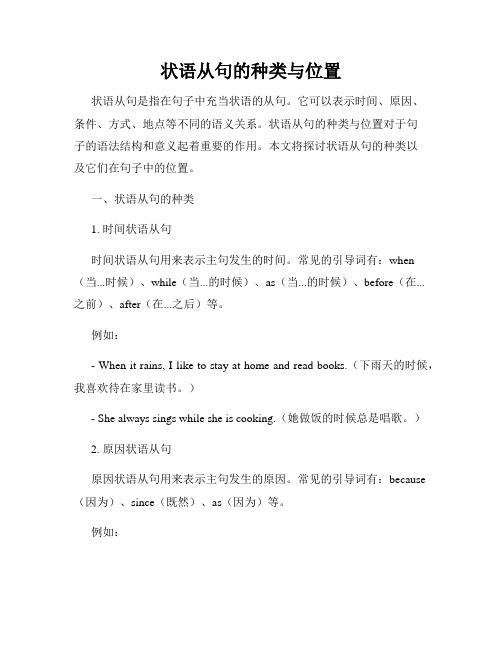
状语从句的种类与位置状语从句是指在句子中充当状语的从句。
它可以表示时间、原因、条件、方式、地点等不同的语义关系。
状语从句的种类与位置对于句子的语法结构和意义起着重要的作用。
本文将探讨状语从句的种类以及它们在句子中的位置。
一、状语从句的种类1. 时间状语从句时间状语从句用来表示主句发生的时间。
常见的引导词有:when (当...时候)、while(当...的时候)、as(当...的时候)、before(在...之前)、after(在...之后)等。
例如:- When it rains, I like to stay at home and read books.(下雨天的时候,我喜欢待在家里读书。
)- She always sings while she is cooking.(她做饭的时候总是唱歌。
)2. 原因状语从句原因状语从句用来表示主句发生的原因。
常见的引导词有:because (因为)、since(既然)、as(因为)等。
例如:- I didn't go to the party because I was feeling sick.(我没有去参加派对是因为我感觉不舒服。
)- Since it's raining outside, we should take an umbrella.(外面下雨了,我们应该带把伞。
)3. 条件状语从句条件状语从句用来表示主句发生的条件。
常见的引导词有:if(如果)、unless(除非)、provided(只要)、as long as(只要)等。
例如:- If you study hard, you will pass the exam.(如果你努力学习,你会通过考试。
)- Unless you finish your homework, you can't go out to play.(除非你完成作业,否则你不能出去玩。
)4. 方式状语从句方式状语从句用来表示主句发生的方式。
状语从句的种类和用法
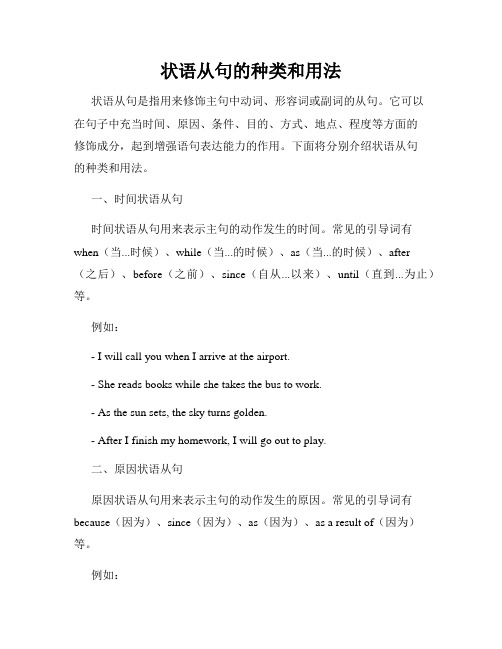
状语从句的种类和用法状语从句是指用来修饰主句中动词、形容词或副词的从句。
它可以在句子中充当时间、原因、条件、目的、方式、地点、程度等方面的修饰成分,起到增强语句表达能力的作用。
下面将分别介绍状语从句的种类和用法。
一、时间状语从句时间状语从句用来表示主句的动作发生的时间。
常见的引导词有when(当...时候)、while(当...的时候)、as(当...的时候)、after(之后)、before(之前)、since(自从...以来)、until(直到...为止)等。
例如:- I will call you when I arrive at the airport.- She reads books while she takes the bus to work.- As the sun sets, the sky turns golden.- After I finish my homework, I will go out to play.二、原因状语从句原因状语从句用来表示主句的动作发生的原因。
常见的引导词有because(因为)、since(因为)、as(因为)、as a result of(因为)等。
例如:- I cannot go to the party because I have to work.- Since it is raining, we will stay indoors.- He failed the exam, as he didn't study enough.- She was late as a result of heavy traffic.三、条件状语从句条件状语从句用来表示主句的动作发生的条件。
常见的引导词有if (如果)、unless(除非)、provided that(只要)、as long as(只要)等。
例如:- If it rains tomorrow, we will cancel the picnic.- Unless you apologize, I will not forgive you.- You can go to the party provided that you finish your homework.- I will lend you my car as long as you promise to drive safely.四、目的状语从句目的状语从句用来表示主句的动作的目的或意图。
状语从句的种类
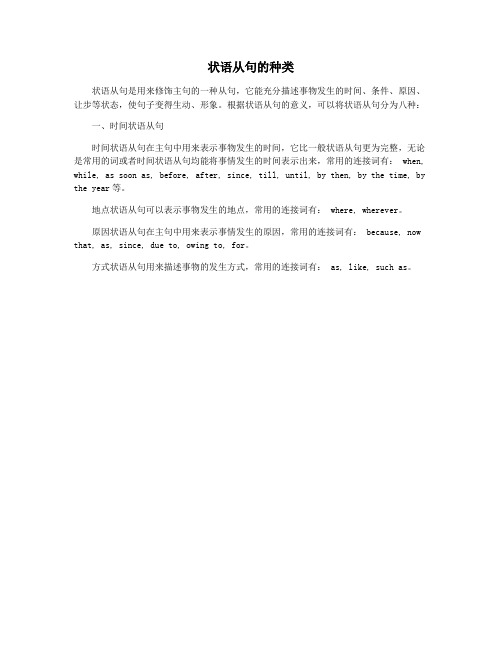
状语从句的种类
状语从句是用来修饰主句的一种从句,它能充分描述事物发生的时间、条件、原因、让步等状态,使句子变得生动、形象。
根据状语从句的意义,可以将状语从句分为八种:
一、时间状语从句
时间状语从句在主句中用来表示事物发生的时间,它比一般状语从句更为完整,无论是常用的词或者时间状语从句均能将事情发生的时间表示出来,常用的连接词有: when, while, as soon as, before, after, since, till, until, by then, by the time, by the year等。
地点状语从句可以表示事物发生的地点,常用的连接词有: where, wherever。
原因状语从句在主句中用来表示事情发生的原因,常用的连接词有: because, now that, as, since, due to, owing to, for。
方式状语从句用来描述事物的发生方式,常用的连接词有: as, like, such as。
状语从句的种类与状语从句引导词的特点

状语从句的种类与状语从句引导词的特点状语从句是指在句子中充当状语的从句,用来修饰动词、形容词、副词或整个句子,以表达时间、地点、原因、条件、目的、方式、程度等不同的状况或情况。
状语从句是复合句的一种重要成分,正确运用各种类型的状语从句能够丰富文章的表达,使语言更加准确、有力。
本文将介绍状语从句的种类以及各种状语从句引导词的特点。
一、时间状语从句时间状语从句是用来表示动作发生的时间、顺序或频率。
常见的时间状语从句引导词有when(当…时候)、while(当…的时候)、before(在...之前)、after(在...之后)等。
例如:1. I will go to the gym when I finish my work.我会在完成工作之后去健身房。
2. While I was cooking, the phone rang.正当我正在煮饭的时候,电话响了。
二、地点状语从句地点状语从句是用来表示动作发生的地点或方向。
常见的地点状语从句引导词有where(在哪里)、wherever(无论在哪里)等。
例如:1. I will meet you where we agreed upon.我会在我们约定的地方见你。
2. Wherever you go, I will follow you.无论你去哪里,我都会跟随你。
三、原因状语从句原因状语从句是用来表示动作发生的原因或缘由。
常见的原因状语从句引导词有because(因为)、since(既然)、as(因为)等。
例如:1. He couldn't come to the party because he was sick.他因为生病不能来参加聚会。
2. Since you don't like seafood, we won't go to the seafood restaurant.既然你不喜欢海鲜,我们就不去海鲜餐厅了。
四、条件状语从句条件状语从句是用来表示动作发生的条件或前提。
状语从句的种类与位置的选择

状语从句的种类与位置的选择在英语中,状语从句是一种常见的语法结构,用以修饰主句的动词、形容词或副词。
状语从句的种类与位置的选择对于语句的意思和结构有着重要影响。
本文将就状语从句的种类以及适当的位置进行探讨。
一、状语从句的种类1. 时间状语从句时间状语从句用以表示动作或事件发生的时间。
常见的引导词有:when(当...时候)、while(当...期间)、after(在...之后)、before (在...之前)、since(自从)、until(直到)、as soon as(一...就)等。
例句:- Please call me when you arrive home. (当你到家的时候请给我打电话。
)- I will finish my homework before I go to bed. (我会在睡觉前完成作业。
)2. 条件状语从句条件状语从句用以表示发生某种条件下才会出现的结果。
常见的引导词有:if(如果)、unless(除非)、provided that(只要)、on condition that(在...情况下)等。
例句:- If it rains tomorrow, we will stay at home. (如果明天下雨,我们会待在家里。
)- She will not pass the exam unless she studies hard. (除非她用功,她不会通过考试。
)3. 地点状语从句地点状语从句用以表示动作的地点。
常见的引导词有:where(在哪里)、wherever(无论在哪里)、anywhere(任何地方)、everywhere(到处)等。
例句:- I will meet you where we first met. (我会在我们第一次见面的地方见你。
)- You can find good food everywhere in this city. (在这个城市,到处都有好吃的东西。
状语从句的种类与使用场景
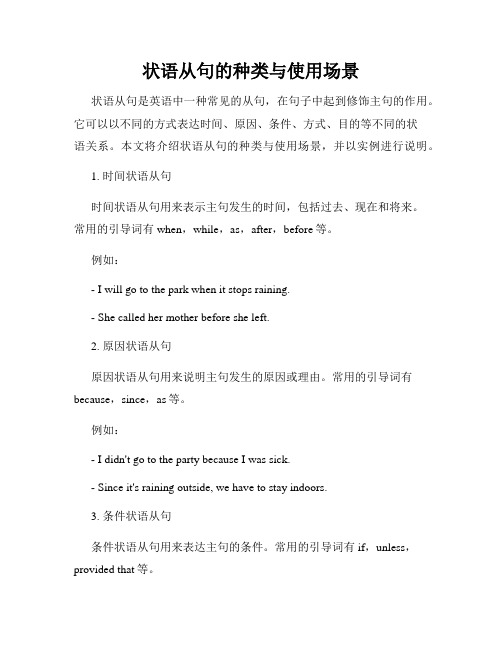
状语从句的种类与使用场景状语从句是英语中一种常见的从句,在句子中起到修饰主句的作用。
它可以以不同的方式表达时间、原因、条件、方式、目的等不同的状语关系。
本文将介绍状语从句的种类与使用场景,并以实例进行说明。
1. 时间状语从句时间状语从句用来表示主句发生的时间,包括过去、现在和将来。
常用的引导词有when,while,as,after,before等。
例如:- I will go to the park when it stops raining.- She called her mother before she left.2. 原因状语从句原因状语从句用来说明主句发生的原因或理由。
常用的引导词有because,since,as等。
例如:- I didn't go to the party because I was sick.- Since it's raining outside, we have to stay indoors.3. 条件状语从句条件状语从句用来表达主句的条件。
常用的引导词有if,unless,provided that等。
例如:- If it rains tomorrow, we will stay at home.- He won't pass the exam unless he studies harder.4. 方式状语从句方式状语从句用来描述主句发生的方式或方式。
常用的引导词有as,like,the way等。
例如:- He runs as if he is flying.- She sings like an angel.5. 目的状语从句目的状语从句用来表示主句的目的或意图。
常用的引导词有so that,in order that等。
例如:- I study hard so that I can pass the exam.- We brought an umbrella in order that we won't get wet.总结:状语从句可以分为时间、原因、条件、方式和目的五种类型。
小学六年级状语从句的种类与用法详解
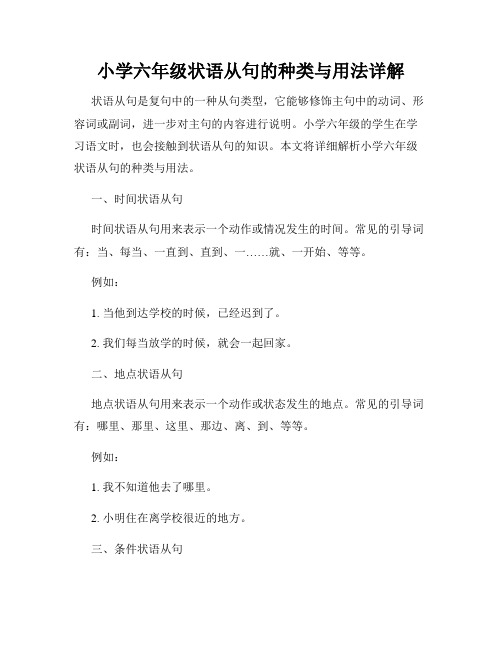
小学六年级状语从句的种类与用法详解状语从句是复句中的一种从句类型,它能够修饰主句中的动词、形容词或副词,进一步对主句的内容进行说明。
小学六年级的学生在学习语文时,也会接触到状语从句的知识。
本文将详细解析小学六年级状语从句的种类与用法。
一、时间状语从句时间状语从句用来表示一个动作或情况发生的时间。
常见的引导词有:当、每当、一直到、直到、一……就、一开始、等等。
例如:1. 当他到达学校的时候,已经迟到了。
2. 我们每当放学的时候,就会一起回家。
二、地点状语从句地点状语从句用来表示一个动作或状态发生的地点。
常见的引导词有:哪里、那里、这里、那边、离、到、等等。
例如:1. 我不知道他去了哪里。
2. 小明住在离学校很近的地方。
三、条件状语从句条件状语从句用来表示达到某种条件时,才会出现的结果。
常见的引导词有:如果、要是、只要、除非、等等。
例如:1. 如果你努力学习,就会取得好成绩。
2. 要是天气不好,我们就不去游泳。
四、原因状语从句原因状语从句用来表示一个动作或情况发生的原因。
常见的引导词有:因为、由于、由……而导致、等等。
例如:1. 因为下雨了,所以我们不能出去玩。
2. 由于他生病了,他没来上课。
五、方式状语从句方式状语从句用来表示一个动作的方式或行为的方式。
常见的引导词有:如何、怎样、像、以……方式、等等。
例如:1. 请告诉我怎样学好英语。
2. 我们要以积极的方式面对挑战。
六、结果状语从句结果状语从句用来表示一个动作或情况的结果。
常见的引导词有:以至于、结果、因此、所以、等等。
例如:1. 他努力学习,以至于成为了班级的优等生。
2. 天气太冷了,所以我们决定不去游泳。
七、让步状语从句让步状语从句用来表示尽管有某种情况或条件,但仍然发生了某个动作或情况。
常见的引导词有:尽管、虽然、即使、纵使、等等。
例如:1. 尽管下雨了,但他还是坚持去打篮球。
2. 即使你不同意,我也会坚持我的观点。
综上所述,小学六年级的学生需要掌握不同种类状语从句的用法。
状语从句---图解

tha n
No sooner had we got to the station than the train left.
我要把你的电话号码记下来,以免忘记。
we ll tell you the truth so that you can judge for yourself.
我把真实情况告诉你,使你能自己作出判 断。
They worked harder tha n usual in order that they could finish the work ahead of time .他们比往常更加努力工作,为了能提前完 成工作。
even
即使明天下雨,我也要去。
的意思为“即使”“纵
though
使”有退一步设想的意
句
味,多用于书面语中。
种类
The mome nt I heard the son g, I felt cheerful.我一听到这首歌,就感到很愉快。
Next time you come ,you'll see him.
下次你来的时候,就会见到他。
在时间状语从句中,不能用将来时或过 去将来时,而要用现在时或过去时代替 将来时。
seeing (that), now that禾口since, as意义相似,他们都 有“鉴于某个事实”的意思,that可以省去。
目 的 状 语 从 句
that
so that
in order that
- 1、下载文档前请自行甄别文档内容的完整性,平台不提供额外的编辑、内容补充、找答案等附加服务。
- 2、"仅部分预览"的文档,不可在线预览部分如存在完整性等问题,可反馈申请退款(可完整预览的文档不适用该条件!)。
- 3、如文档侵犯您的权益,请联系客服反馈,我们会尽快为您处理(人工客服工作时间:9:00-18:30)。
状语从句的种类1.时间状语从句2.地点状语从句3.原因状语从句4.条件状语从句5.目的状语从句6.让步状语从句7.比较状语从句8.方式状语从句9.结果状语从句状语从句的时态特点:一般情况下,时间和条件状语从句的谓语动词一般用“一般现在时”表示“一般将来时”,用“现在完成时”表示“将来完成时”。
例如:1)I will call you as soon as I arrive in Beijing. 我到北京就将给你打电话。
(这是由as soon as引导的时间状语从句,从句中的谓语动词arrive是一般现在时,表示一般将来时,决不可用will arrive)2)As soon as I have finished this work, I will go home. 我一完成此工作,就回家。
(从句中的谓语动词用现在完成时have finished,表示将来完成时,决不可用will have finished)3)If he comes back, please let me know.如果他回来了,请通知我。
(从句中的谓语动词用comes back,表示一般将来时,绝不可用will come back)状语从句讲解和练习状语修饰动词、形容词、副词或整个句子。
通常由副词、介词短语、动词不定式、分词和从句等担当。
例如:1. Naturally , our grandparents were pleased to get our phone call . (副词)2. We worked hard , from sunrise to sunset . (介词状短语)3. To help my disabled aunt , I spend an hour working in her house every day . (不定式)4. Seen from a distance , the farmhouse looked deserted . (过去分词)5. I know how to light a camp fire because I had done it before .(原因状语从句)状语的位置比较灵活,可以位于句首、句末或句中。
enough用作状语修饰形容词和副词时必须后置。
状语从句主要用来修饰主句或主句的谓语。
一般可分为九大类,分别表示时间、地点、原因、目的、结果、条件、让步、比较和方式。
尽管种类较多,但由于状语从句与汉语结构和用法相似,所以理解和掌握它并不难。
状语从句的关键是要掌握引导不同状语从句的常用连接词和特殊的连接词即考点。
现分别列举如下:1.时间状语从句常用引导词:when, as, while, as soon as, before, after, since , till, until特殊引导词:the minute, the moment, the second, every time, the day,the instant, immediately , directly, no sooner …than, hardly …when, scarcely …when例如:I didn’t realize how special my mother was until I became an adult.While John was watching TV, his wife was cooking.The children ran away from the orchard(果园), the moment they saw the guard.No sooner had I arrived home ,then it began to rain.Every time I listen to your advice, I get into trouble.2.地点状语从句常用引导词:where特殊引导词:wherever, anywhere, everywhere例如:Generally, air will be heavily polluted where there are factories.Wherever you go, you should work hard.地点状语从句一般由连接副词where, wherever等引导,已经形成了固定的句型,例如:句型1:Where+地点从句,(there)+主句。
【注意】此句型通常译成“哪里……哪里就……”;主句在从句后面时,there可用可不用;如果主句在从句的前面时,一般都不用there。
例如:Where there is no rain, farming is difficult or impossible.在没有雨水的地方,耕作是困难的,或根本不可能的。
They were good persons. Where they went, there they were warmly welcomed. 他们都是好人。
因此他们走到哪里都受到热烈欢迎。
You should have put the book where you found it. 你本来应该把书放回原来的地方。
Where the Communist Party of China goes, there the people are liberated.哪里有了中国共产党,哪里人民就得解放。
句型2:Anywhere/ wherever+地点从句,+主句。
【注意】anywhere本身是个副词,但是,常可以引导从句,相当于连词,意思相似于wherever, anywhere引导的从句可位于主句之前,也可以位于主句之后。
而wherever本身就是个连词,表示“在何处,无论何处”。
例如:Wherever the sea is , you will find seamen.有海就有海员。
3.原因状语从句常用引导词:because, since, as, for特殊引导词:seeing that, now that, in that, considering that, given that. 例如:My friends dislike me because I’m handsome and successful. Now that everybody has come, let’s begin our conference.The higher income tax is harmful in that it may discourage people from trying to earn more. 4.目的状语从句常用引导词:so that, in order that特殊引导词:lest, in case, for fear that,in the hope that, for the purpose that, to the end that 例如:The boss asked the secretary to hurry up with the letters so that he could sign them.The teacher raised his voice on purpose that the students in the back could hear more clearly. 5.结果状语从句常用引导词:so …that, such …that,特殊引导词:such that, to the degree that, to the extent that, to such a degree that, 例如:He got up so early that he caught the first bus. It’s such a good chance that we must not miss it.To such a degree was he excited that he couldn’t sleep last night.6.条件状语从句常用引导词:if, unless,特殊引导词:as/so long as, only if, providing/provided that, supposing that, in case that, on condition that例如:We’ll start our project if the president agrees.You will certainly succeed so long as you keep on trying.Provided that there is no opposition, we shall hold the meeting here.7.让步状语从句常用引导词:though, although, even if, even though特殊引导词:as(用在让步状语从句中必须要倒装),while ( 一般用在句首),no matter …,in spite of the fact that, while, whatever, whoever, wherever, whenever, however, whichever 例如:Much as I respect him, I can’t agree to his proposal. 尽管我很尊敬他,我却不同意他的建议。
The old man always enjoys swimming even though the weather is rough.No matter how hard he tried, she could not change her mind.He won’t listen whatever you may say.8.比较状语从句常用引导词:as(同级比较), than(不同程度的比较)特殊引导词:the more …the more …just as …,so…; A is to B what /as X is to Y; no …more than; not A so much as B例如:She is as bad-tempered as her mother.The house is three times as big as ours.The more you exercise, the healthier you will be.Food to men is what oil is to machine. 食物之于人,犹如油之于机器。
